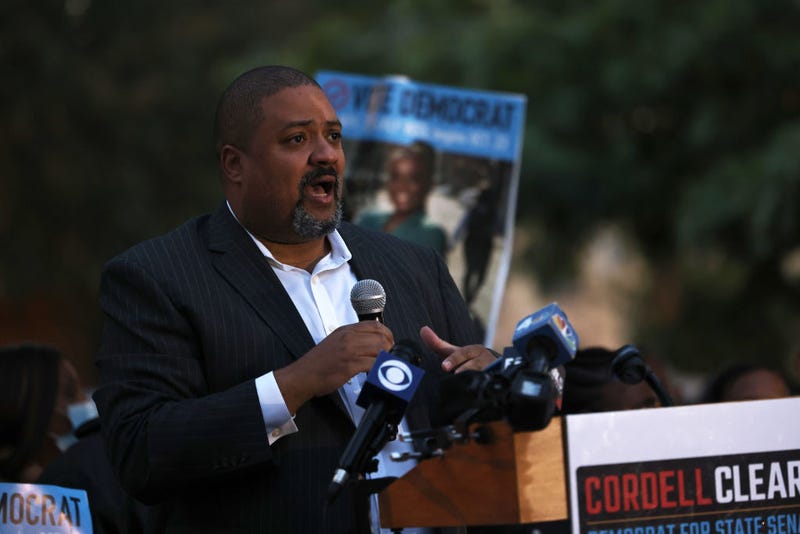
NEW YORK (WCBS 880) -- After the new commissioner of the NYPD made it known that she was “concerned” by a list of new policies Manhattan District Attorney Alvin Bragg introduced, the two sat down in an attempt to hash things out Tuesday.

The NYPD and Manhattan DA’s office issued a joint statement Tuesday after the meeting between Bragg and NYPD Commissioner Keechant Sewell.
“Today, Manhattan District Attorney Alvin Bragg and Police Commissioner Keechant Sewell, and senior staff members met to discuss issues of mutual concern. The discussion was open, candid and productive. The meeting was to share ideas and examine policy differences that could be clarified and harmonized toward a common vision that acknowledges the need for criminal justice reform and alternatives to incarceration,” the statement said.
“It was agreed that police and prosecutors would weigh the individual facts and circumstances of each case with a view toward justice and work together to keep New Yorkers safe. These collaborative discussions will continue,” it concluded.
The outcry began quickly after Bragg, who assumed his new role on the same day as Sewell, issued a memo to his office days later that said he wouldn’t prosecute some low-level crimes and would avoid issuing bail except in serious circumstances.
Bragg said he would no longer prosecute marijuana misdemeanors, fare beating and resisting arrest, unless the latter is accompanied felony charges. The office also said it wouldn’t after misdemeanor trespassing, obstruction of governmental administration and prostitution.
Bragg said he’d avoid a “carceral sentence” except in homicide cases, other cases involving victim deaths, violent felonies causing serious injuries, domestic violence felonies, many sex offenses, public corruption and “major economic crimes.” The DA said the rules can come with exception based on a “holistic analysis of the facts.”
Late last week, Sewell reportedly issued a memo to her department, making her concerns clear.
“I have studied these policies and I am very concerned about the implications to your safety as police officers, the safety of the public and justice for the victims,” Sewell said.
She went on to say the policies would “invite violence against police officers and will have deleterious effects on our relationship with the communities we protect … the new charging policies of the Manhattan District Attorney effectively decriminalizes much of the conduct that New Yorkers are asking the police to address.”
Bragg also said pretrial detention should be reserved for “very serious” cases, especially with the crisis on Rikers Island. Sewell referenced this recommendation specifically.
“In addition to gun possession, I am concerned that pretrial incarceration will no longer be sought for charges such as terrorism, criminal sale of a firearm, gun-point robberies,” Sewell wrote. “And other serious violent felonies that put the safety of the public and the police officers who have sworn to protect and serve at great risk.”
Bragg responded over the weekend, saying their conversation wouldn’t take place through the media, adding that, “Safety is paramount … if you use a gun to rob a store, or any armed robbery, you will be prosecuted for a felony. I've prosecuted cases involving assaulting law enforcement, and if you punch a police officer, you will be prosecuted for a felony.”
Other points of emphasis in Bragg’s controversial memo include that in drug cases, if there’s a “reasonable view” that the accused dealer is a “low-level agent of a seller,” they’ll typically be charged with misdemeanor possession.
In robbery cases, Bragg said incidents in commercial settings should be charged as petit larceny “if the force or threat of force consists of displaying a dangerous instrument or similar behavior but does not create a genuine risk of physical harm.”
“A gun-point robbery is a gun-point robbery — it should be immaterial to a victim that it happened in a commercial establishment as opposed to on the street, and the assailant should face the full consequences of the law,” Sewell wrote.
The moves caused immediate outcry from groups like the New York City Police Benevolent Association, with President Patrick Lynch saying they had "serious concerns" about Bragg's memo.
"Police officers don’t want to be sent out to enforce laws that the district attorneys won’t prosecute," said Lynch. "And there are already too many people who believe that they can commit crimes, resist arrest, interfere with police officers and face zero consequences."




